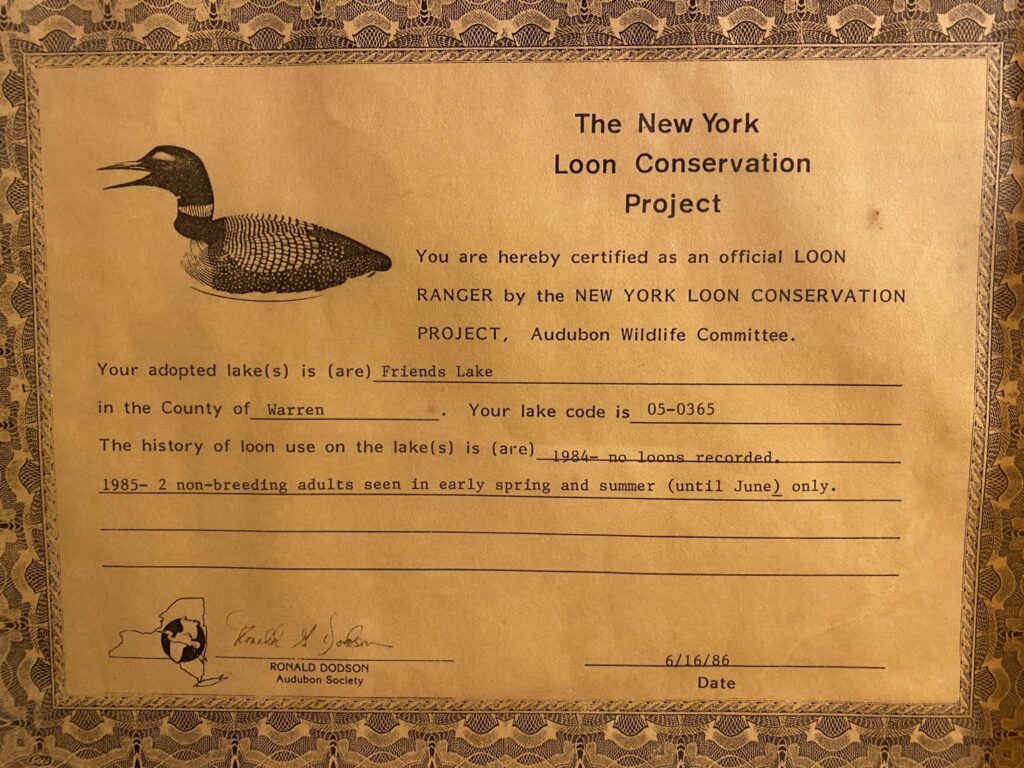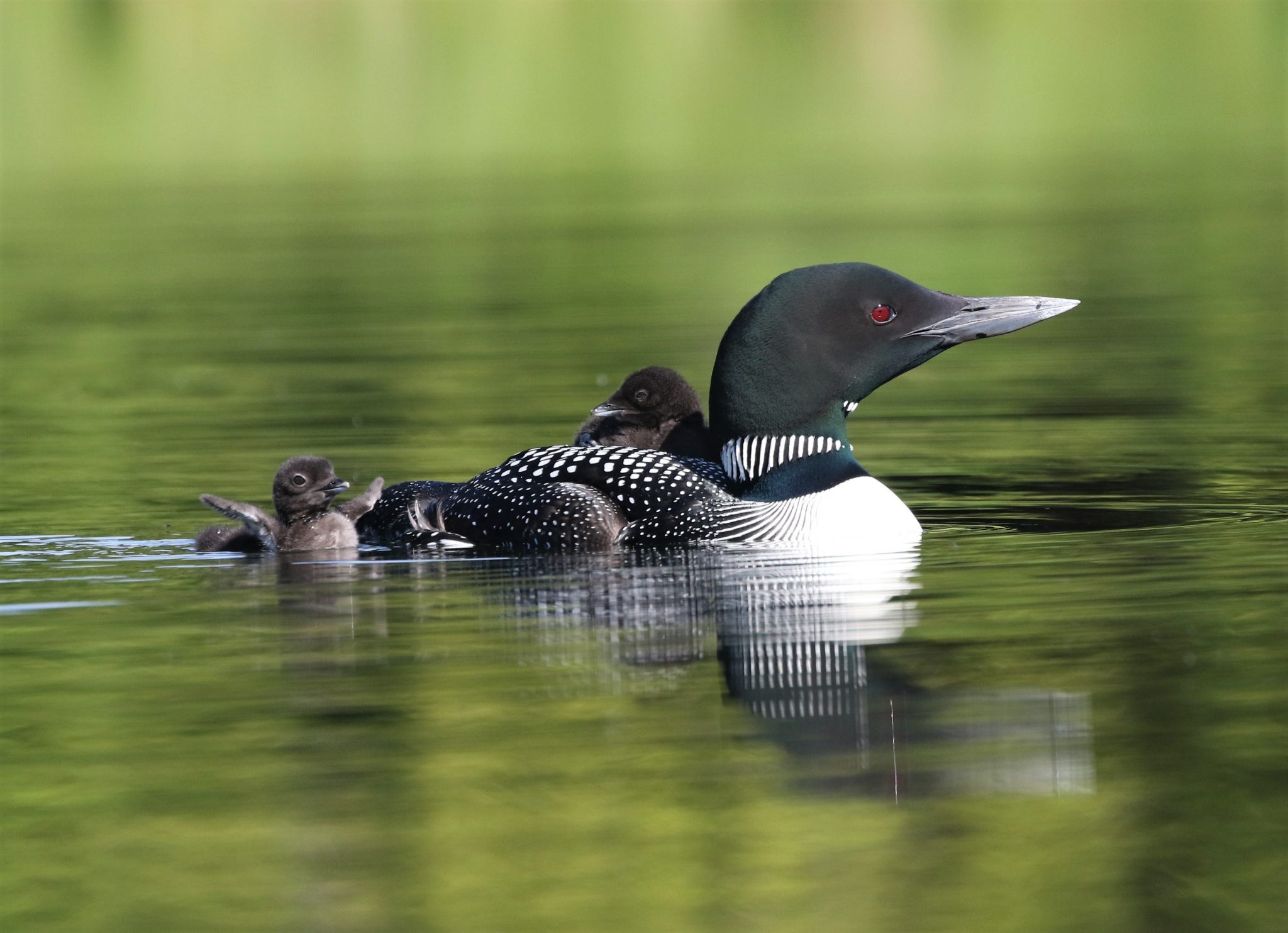Loons and other wildlife are vital to the health and beauty of our lake ecosystem. Human activity can disturb their habitats, disrupt nesting, and even threaten their survival. Follow these best practices to ensure you’re helping to protect these incredible creatures.
Respect Nesting Areas
Loons are especially vulnerable during their nesting season (spring and summer).
- Keep your distance: Stay at least 200 feet away from any nests or marked areas.
- Avoid loud noises: Sudden sounds can scare loons off their nests, leaving eggs exposed to predators.
- Watch for warning signs: If loons are vocalizing, diving frequently, or showing aggression, you’re too close.
Be Mindful While Boating
Boating can unintentionally harm loons and their chicks.
- Slow down in shallow areas: High speeds can create waves that swamp nests or separate loon families.
- Look out for chicks: Loon chicks often rest on the water and are hard to see.
- Avoid sensitive areas: Stick to designated boating routes and steer clear of wildlife sanctuaries or nesting zones.
Use Lead-Free Fishing Tackle
Lead poisoning from fishing tackle is one of the leading causes of death for loons.
- Switch to non-toxic alternatives: Use lead-free sinkers and jigs.
- Properly dispose of fishing line and old tackle: Recycle or discard lead tackle responsibly to prevent it from entering the water. Remove fishing line that is wrapped around branches.
- There are fishing line recycling containers at a number of associations around the lake.
- If you would like a recycling container at your beach, please contact us.
- Learn more at Get the Lead Out! (ny.gov).
- The Crossroads in Chestertown accepts lead sinkers for proper disposal, which are toxic to loons and spread through the food chain to eagles and other birds of prey.
Keep the Water Clean
Polluted water harms both wildlife and the lake ecosystem.
- Dispose of trash properly: Never leave litter behind. Even small items like fishing line or plastic rings can entangle loons and other animals.
- Clean up trash, recyclables, and cigarette butts that you find in and around the lake, including on the roads, as things can get washed into the lake.
- Avoid chemical runoff: Limit the use of fertilizers, pesticides, and soaps near the water.
- Pump out septic systems regularly: This reduces the risk of nutrient runoff that causes harmful algal blooms
Don’t feed wildlife
Feeding alters their natural diets and can make them dependent on humans. Feeding ducks or geese will encourage them to congregate close to shore, which could lead to swimmer’s itch, a painful rash caused by parasites in their feces. It’s also not good for the birds, who have plenty of nature’s food available in and around the lake. Feeding bread to developing goslings and ducklings can cause harm to their bones, potentially causing angel wing, which prohibits them from flying and therefore migrating. This can be a death sentence for these birds.
Use binoculars: Avoid getting too close by using tools to observe wildlife from afar.
Close interactions can stress wildlife and disrupt their natural behavior.
Watch Wildlife from a Distance
Observing wildlife is one of the joys of living near the lake—just do so responsibly.
- Use binoculars: Avoid getting too close by using tools to observe wildlife from afar.
- Don’t feed wildlife: Feeding disrupts animals’ natural behaviors and diets, creating dependency on humans.
Use Humane Rodent Control
Rodenticides and glue traps harm not only rodents but also predators like owls, hawks, and foxes.
- Avoid poison and glue traps: These methods are cruel and can harm non-target species like foxes, owls, hawks and even our pets.
- Choose humane alternatives: Use snap traps (wood and metal) or electronic traps to control rodents.
- Be mindful of ecosystem health: Predators like owls and foxes naturally control rodent populations—keep them safe by avoiding toxins.
Report Injured or Orphaned Wildlife
If you find wildlife in need, follow these steps:
- Contact professionals: Call North Country Wild Care’s 24 hour hotline at 518-964-6740.
- Use Animal Help Now: Visit their website or app to locate the nearest wildlife rescue organization.
- Do not attempt care yourself: Handling injured animals improperly can cause more harm.
Avoid Attracting Bears
- Bears are drawn to food left out in residential areas, which can lead to dangerous encounters.
- Secure trash and compost: Store garbage and compost in bear-proof containers or indoors until collection day.
Minimize Shoreline Development
- Limit bird feeding: Only fill feeders from late fall to early spring when bears are hibernating. Birds have plenty of natural food during the summer.
- Clean feeders regularly: Use a 10% bleach solution once a week to prevent harmful bacteria from spreading between birds.
- Enjoy from afar: Use binoculars or a camera zoom to observe loons and other animals.
Loons and other wildlife need natural spaces to thrive.
- Preserve natural vegetation: Native plants provide cover, food, and nesting areas for wildlife.
- Avoid building docks near nests: Docks can make nesting sites more accessible to predators.
- Keep pets leashed: Loose dogs can disturb or destroy loon nests.
Get Involved in Conservation
Help ensure loons and wildlife thrive for generations to come.
- Report injured wildlife: Contact a local wildlife rescue or conservation organization if you spot a loon or other animal in distress.
- Participate in conservation efforts: Volunteer for local habitat cleanups, invasive species removal, or loon monitoring programs.
- Educate others: Share these tips with neighbors and visitors to create a wildlife-friendly community.
Remember: Protecting loons and other wildlife is about respecting their space, maintaining clean water, and minimizing human impact. Together, we can preserve the beauty and health of our lake ecosystem.
History of Loons on Friends Lake
1984 saw no loons on Friends Lake! Many people recall growing up never seeing any loons, osprey, or eagles on the lake either. Today, there have been dozens of loons, a nesting pair of bald eagles and osprey spotted on Friends Lake.


